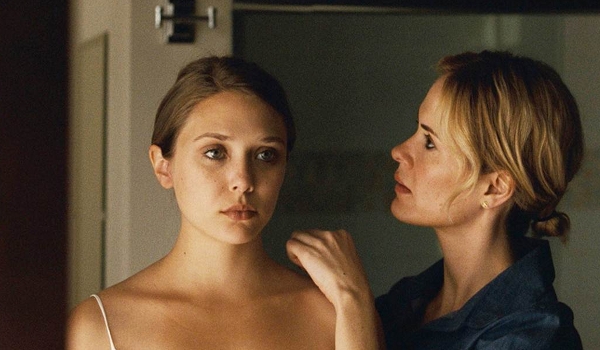Review: Martha Marcy May Marlene (2011)
You’d be forgiven for thinking there was no way in hell Martha Marcy May Marlene could be writer/director Sean Durkin’s first feature film. There is such a mastery of craft and visual storytelling on display here, even if the film is a bit chilly at times, but that’s not necessarily a bad thing. We’re meant to feel unsettled and downright disturbed by what may or may not have happened to Martha, or is it Marcy May?
Elizabeth Olsen gives a star-making debut performance; one that I would hope gets her a nomination for Best Actress. The way she internalizes her psychological trauma is haunting and clenched, as her mind slowly begins to unravel. We get hints of it coming out every so often, as she blurts out things that make no sense, but show telltale signs of brainwashing. It’s an incredibly brave performance, especially for a debut, and given the infamy her family name carries with her two older sisters. But she pours her soul into a lived-in portrayal that left this viewer thoroughly disturbed. The rest of the ensemble delivers, with John Hawkes as the charismatic but thoroughly evil cult leader, and Sarah Paulson as the older sister desperately trying to help Martha while tending to her own family’s needs.
Enough cannot be said of Sean Durkin’s raw talent as a director here. Carefully weaving the past and present until they collide in a manner that could easily be mistaken for nightmare, rather than memory, he really puts us in the mind of Martha, through a combination of sly visual cues and an incredible sound design. And Durkin isn’t pulling any punches here. The film gracefully presents instances of dated gender politics within the cult. The women don’t eat until the men are finished; they all sleep in the same room, and share clothes. It is heavily but not bluntly inferred that Patrick (John Hawkes) is raping every single woman in the cult, but they are so brainwashed (or perhaps just naïve) to the point of not recognizing it as such. He also only seems to recruit young women who happen to be virgins, and has several children by these women. Though Martha seems to sense something is not right. Sex with Patrick is cold and mechanical, with him always initiating it without her permission. Contrast that with a sort of orgy amongst the younger 20-somethings of the cult after a successful breaking and entering theft, and one sees the difference in the two acts. It’s one of the many ugly things about the “family” that Durkin pulls back the curtain on slowly as the film progresses.
As Martha’s sanity begins to unravel, so too does the mystery of what exactly happened to her at the commune and why she finally drew a line enough to leave them. The audience may feel that her sister and brother in-law are overreacting to her swimming in the nude, but when she crawls into bed with them while they are having sex one night (and barely seems to comprehend why it’s not ok) we begin to see signs of the irreversible psychological trauma inflicted upon her. Her increasing paranoia of the cult coming to reclaim her, or worse, murder her and her family, is only heightened by the incredible tension Durkin builds throughout, culminating in a scene involving a panic attack and the final moments of the film, which are some of the more haunting things put to film this year.
If anything, the film feels incredibly dense, almost suffocating at times. “Clenched” is the word I keep coming back to. The tension is there from the get-go and never once lets up. It has moments where one can exhale, but watching Martha’s paranoia and bizarre behavior escalate is both disturbing and tragic. It’s masterfully crafted, but emotionally impenetrable most of the time, which makes the film hard to really embrace. But it remains one of the most impeccably made films of the year that I fully recommend.






















 Review: To the Wonder (2012)
Review: To the Wonder (2012) Review: Antiviral (2012)
Review: Antiviral (2012) TIFF Spotlight Japan Review: Late Autumn (1960)
TIFF Spotlight Japan Review: Late Autumn (1960) TIFF Spotlight Japan Review: The Warped Ones (1960)
TIFF Spotlight Japan Review: The Warped Ones (1960) Review: Evil Dead (2013)
Review: Evil Dead (2013)




